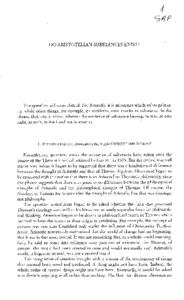Por favor, use este identificador para citar o enlazar este ítem:
https://repositorio.uca.edu.ar/handle/123456789/12887| Campo DC | Valor | Lengua/Idioma |
|---|---|---|
| dc.contributor.author | McInerny, Ralph | es |
| dc.date.accessioned | 2021-11-15T12:01:30Z | - |
| dc.date.available | 2021-11-15T12:01:30Z | - |
| dc.date.issued | 1999 | - |
| dc.identifier.citation | McInerny, R. Do aristotelian substances exist? [en línea]. Sapientia. 1999, 54 (206). Disponible en: https://repositorio.uca.edu.ar/handle/123456789/12887 | es |
| dc.identifier.issn | 0036-4703 | - |
| dc.identifier.uri | https://repositorio.uca.edu.ar/handle/123456789/12887 | - |
| dc.description.abstract | The question will seem absurd. For Aristotle, it is substance which exists primarily, while other things, for example, its accidents, exist thanks to substance. In the phrase, their esse is inesse, whereas the existence of substance belongs to it in its own right, as such, in itself and not in another. Is there a radical difference between Aristotle and Thomas? Nonetheless, questions about the existence of substance have arisen over the course of the Thomistic revival initiated by Leo XIII in 1879. But th,e revival was well under way before it began to be suggested that there was a fundamental difference between the thought.of Aristotle and that of Thomas Aquinas. Discontent began to be expressed with the notion that there is ah Aristotelico-Thomistic philosophy, since the phrase suggests that there is as good as no difference between the philosophical thought of Aristotle and the philosophical thought of Thomas. Of course, the theology of Thomas fax transcended the thought of Aristotle, but that was theology, not philosophy. The question nonetheless began to be asked whether the faith that governed Thomas's theology —as well as his life— was so easily separable from his philosophical thinking. Attention began to be drawn to philosophical tenets of Thomas which seemed to bear the stamp of their origin in revelation. For example, the concept of person \vas one that flourished only under the influence of Christianity. Furthermore, Aristotle notoriously maintained that the world of change had no beginning, that it was in that sense eternal. It was not something that, as a whole, could meaningfully be said to come into existence —or pass out of existence. For Thomas, of course, the world had been created in time and would eventually end. Aristotle's world, it began to be said, was not a created world... | es |
| dc.format | application/pdf | es |
| dc.language.iso | eng | es |
| dc.publisher | Pontificia Universidad Católica Argentina. Facultad de Filosofía y Letras | es |
| dc.rights | Acceso abierto | * |
| dc.rights.uri | http://creativecommons.org/licenses/by-nc-sa/4.0/ | * |
| dc.source | Sapientia Vol. 54, No.206, 1999 | es |
| dc.subject | Aristóteles, 384-322 a.C. | es |
| dc.subject | Tomás de Aquino, Santo, 1225-1274 | es |
| dc.subject | SUSTANCIA | es |
| dc.subject | METAFISICA | es |
| dc.title | Do aristotelian substances exist? | es |
| dc.type | Artículo | es |
| uca.disciplina | FILOSOFIA | es |
| uca.issnrd | 1 | es |
| uca.affiliation | Fil: McInerny, Ralph. University of Notre Dame; Francia | es |
| uca.version | publishedVersion | es |
| item.grantfulltext | open | - |
| item.fulltext | With Fulltext | - |
| item.languageiso639-1 | en | - |
| Aparece en las colecciones: | SAP - 1999 Vol LIV nro. 206 | |
Ficheros en este ítem:
| Fichero | Descripción | Tamaño | Formato | |
|---|---|---|---|---|
| do-aristotelian-substances-exist.pdf | 295,68 kB | Adobe PDF |  Visualizar/Abrir |
Visualizaciones de página(s)
57
comprobado en 27-abr-2024
Descarga(s)
110
comprobado en 27-abr-2024
Google ScholarTM
Ver en Google Scholar
Este ítem está sujeto a una Licencia Creative Commons

